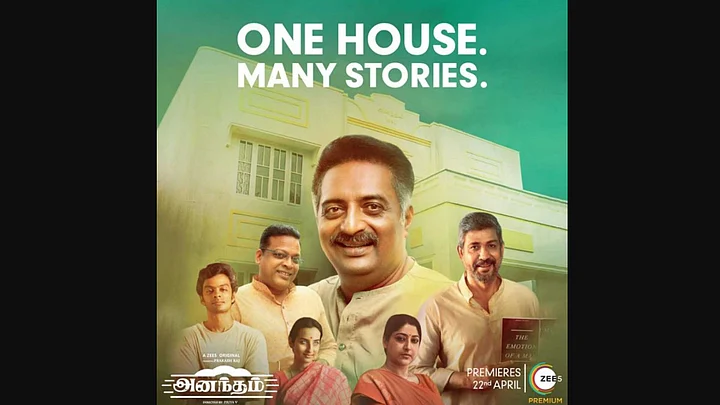Anantham is a treasure house full of memories that were created over several years, consisting of a collection of stories on love, grief, betrayal, success, laughter, horror, and the courage of different families who lived there at different points of time. The series has a background narration of the house which tells us that its walls can share different stories.
Directed by V Priya, who previously worked as an assistant director to Mani Ratnam, Anantham has been streaming on Zee5 since 22 April. This Tamil series consists of eight episodes, running approximately for an hour each, and is available with English subtitles. The show stars Prakash Raj, Sampath Raj, John Vijay, Vivek Rajgopal, Samyuktha, Vinoth Kishan, Indraja, Vivek Prassana, Vinodhini, Anjali Rao, Madhuri and Aravinth Sundar in its pivotal roles.
Ananth (Sampath Raj), the estranged son of the house owner Venkatesan (Prakash Raj) returns to his family home after several years and unravels the mysteries and memories hidden in the house. As a passionate writer, he wants to write a book that weaves the untold stories of the house which comprises both fortunes and disasters for different people. Does he go past his personal traumatic experience in the house and succeed in writing his book? That is the rest of the story.
Anantham doesn't just touch upon, rather talks in detail about taboos associated with visually impaired people, child abuse survivors, divorcees, queer couples, and younger men in relationships with older women.
The part hyper-link, part anthology series takes us on an emotional rollercoaster making us feel like a member of the Anantham house. It lets you connect with most of the characters at a personal level by celebrating their success, bearing their pain, and crying for their losses like our own.
Prakash Raj as Venkatesan has an interesting character arc where he fluctuates from an apparently progressive dad to the worst dad ever and then to an accepting dad who loves his son no matter what. He is an honest and authentic representation of most Indian dads who are liberal to the world but somehow struggle to accept reality when it comes to their own families. He aces it with his effortless performance by depicting the emotional turmoil that the character goes through.
Special mentions to Sampath Raj for his perfectly measured performance, Amrutha Srinivasan for her intense acting and Vinothini for being such a live wire on screen.
The two talents that stand out are Vinoth Kishan and Vivek Rajgopal whose authentic and vulnerable performances stick with you even long after you are done watching the series. It is not an exaggeration if we were to say that Anantham is one of the most sensible portrayals of queer relationships in mainstream cinema.
However, the series does steer away at times with its exaggerated emotionalism and inappropriate theatricalism. For instance, there is melodrama around the narration of the house and how the house is made accountable for every good or bad event that occurs in the tenants’ lives.
While it is a filmmaker’s creative choice to set the context of the story; in this case, predominantly about Brahmin families, the Savarna markers are slightly bothersome with the way the domestic workers like Rani, Mary, and Thotta are treated at some points. For instance, there is a dialogue where Vinodhini says, “Even Rani (a house help) is not respecting me," as a joke.
In addition, the series ends with an ineffective cliffhanger that feels confusing and forced.
However, Anantham makes you feel at home with its underlying theme to accept with love despite imperfections. As an audience member, one tends to love Anantham for its gold intentions despite its imperfections.
Here's an interview with the director:
(At The Quint, we question everything. Play an active role in shaping our journalism by becoming a member today.)
